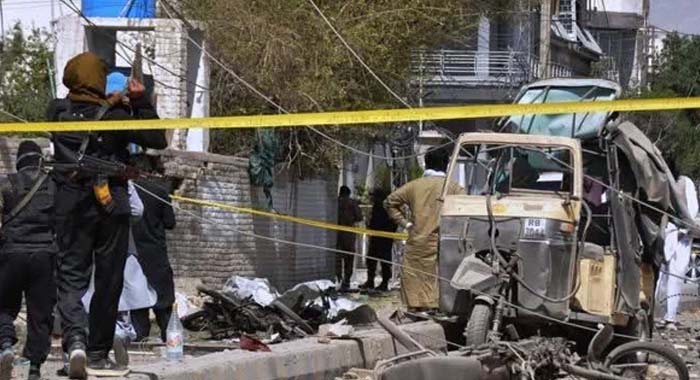Pakistani authorities have said that the latest surge of terrorism in Balochistan, including Thursday’s suicide blast near Pishin Stop in Quetta, bears the imprint of Indian-sponsored proxy networks that continue to destabilise the province. Officials warned that these proxies, while targeting innocent civilians and security forces, also wage propaganda campaigns against Pakistan’s state institutions in an attempt to conceal their crimes.
At least eleven people, including three Frontier Corps (FC) personnel, were martyred and 35 others injured in the Quetta blast. The injured included eight security personnel and five women, several of whom remain in critical condition. In a swift response, security forces neutralised five armed terrorists, recovering weapons and explosives from their possession.
Officials noted that Balochistan has long been the focus of external conspiracies. Since the tragedy of East Pakistan, India has systematically sponsored separatist tendencies and terrorist outfits to weaken Pakistan, with Balochistan at the forefront of its strategy. “This is not an isolated campaign—it is part of a broader Indian agenda of destabilisation, extending from Pakistan to neighbouring states including Bhutan, Sri Lanka, Bangladesh, and even China,” they said.
Authorities pointed to mounting international evidence exposing India’s role in global networks of terrorism, targeted killings, and extra-judicial operations. The resurgence of Indian-backed militant groups in Balochistan, they said, has once again been unmasked. Indian intelligence agencies are accused of providing financing, training, and arms to proscribed outfits, while also facilitating their treatment and maintaining official contacts.
Indian media, they added, often amplifies terrorist propaganda by breaking news of attacks in Pakistan before local outlets and spinning such incidents to malign Pakistan internationally. In some cases, Indian commentators openly advocated establishing offices for banned organisations in New Delhi, underscoring the extent of state-level patronage.
Pakistan, meanwhile, has borne a staggering cost in the fight against terrorism. Over 70,000 lives have been lost and the country has suffered economic losses exceeding $150 billion. Groups such as the banned Tehreek-e-Taliban Pakistan (TTP), Balochistan Liberation Army (BLA) and its Majeed Brigade, along with factions operating from Afghan soil, continue to carry out cross-border terrorism, including high-profile attacks like the Jaffer Express bombing.
Officials also drew attention to India’s alleged role in sponsoring targeted killings abroad, including the recent murder of Sikh leader Hardeep Singh Nijjar in Canada, describing it as another glaring example of Indian state terrorism. Leading international media outlets, including the Washington Post, have reported on India’s involvement in covert killings and destabilisation efforts inside Pakistan.
“Pakistan has fought a long and patient war against terrorism, paying with the blood of its soldiers, civilians, and even children. While we remain committed to peace, we will not compromise on our sovereignty, security, or the safety of our citizens,” the statement said. Officials called upon the international community to take serious cognisance of India’s actions and to prevent cross-border sponsorship of terrorism for the sake of regional peace.
The government stressed that Pakistan’s resolve remains firm. Security forces and intelligence agencies are fully capable of thwarting every hostile attempt. At the same time, officials underscored the importance of addressing internal vulnerabilities through economic stability, education, employment opportunities, social harmony, and robust border security.
“State terrorism will be met with a decisive state response. Pakistan is determined to close this chapter with unity, resilience, and firm strategy so that future generations may live in peace, dignity, and security,” the statement concluded.





